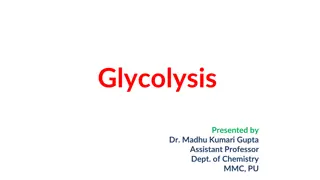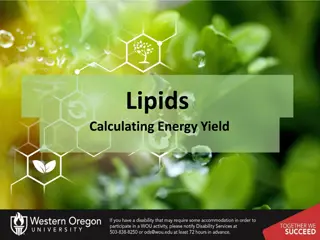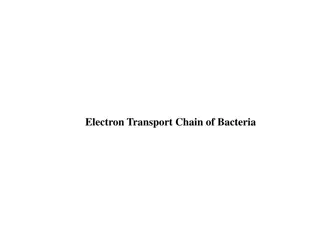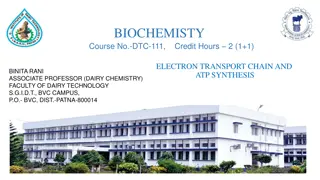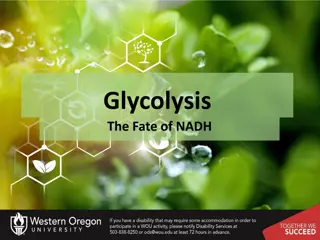Understanding Glycolysis: The Initial Step in Glucose Breakdown
Glycolysis, presented by Dr. Madhu Kumari Gupta, is a crucial process in cellular metabolism that involves the breakdown of glucose to extract energy. This pathway occurs in the cytosol and consists of three main phases - an energy-requiring phase, a splitting phase, and an energy-releasing phase. T
0 views • 12 slides
Energy Yield from Lipid Oxidation Process
Understanding the energy generation process from lipid oxidation involves the conversion of fatty acids into Acetyl-CoA through multiple rounds of oxidation, which then enter the Krebs cycle to produce ATP. Each round of oxidation results in the production of Acetyl-CoA, NADH, FADH2, and net gains o
0 views • 7 slides
Understanding the Electron Transport Chain in Bacteria
The electron transport chain in bacteria plays a crucial role in generating additional ATP by oxidative phosphorylation. It involves the transfer of electrons from NADH and FADH2 to oxygen through a series of membrane-associated electron carriers. The chemiosmotic theory explains how this process fu
4 views • 10 slides
Understanding Electron Transport Chain and ATP Synthesis in Biochemistry
This course delves into the intricacies of electron transport and oxidative phosphorylation in biochemistry, elucidating how NADH and FADH2 are re-oxidized to generate ATP in eukaryotes and prokaryotes. It explores redox potential, oxidation-reduction reactions, and the role of standard redox potent
0 views • 20 slides
Understanding NADH Fate in Cellular Metabolism
Explore the intricate pathways involved in the fate of NADH in cellular metabolism, including aerobic and anaerobic processes such as the Malate Aspartate Shuttle, Glycerol-3Phosphate DHAP Shuttle, and the Cori Cycle. Learn how NADH is recycled and its significance in energy production.
0 views • 9 slides
